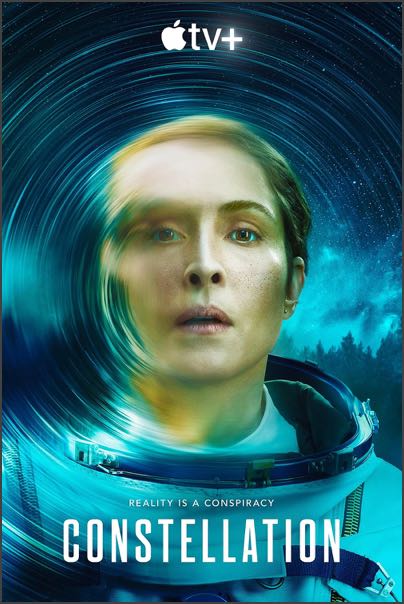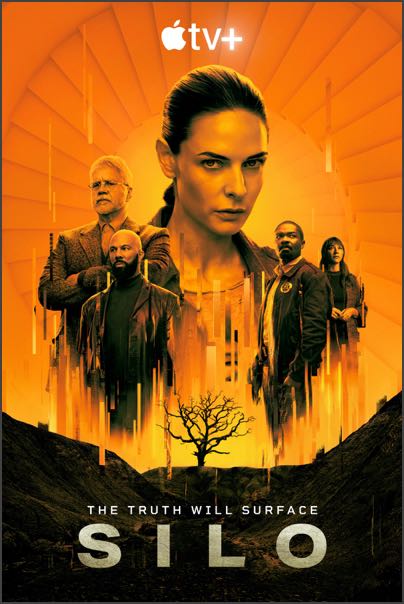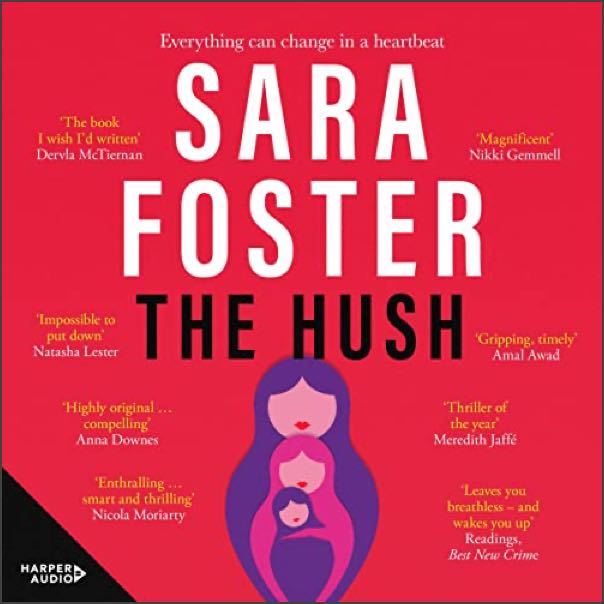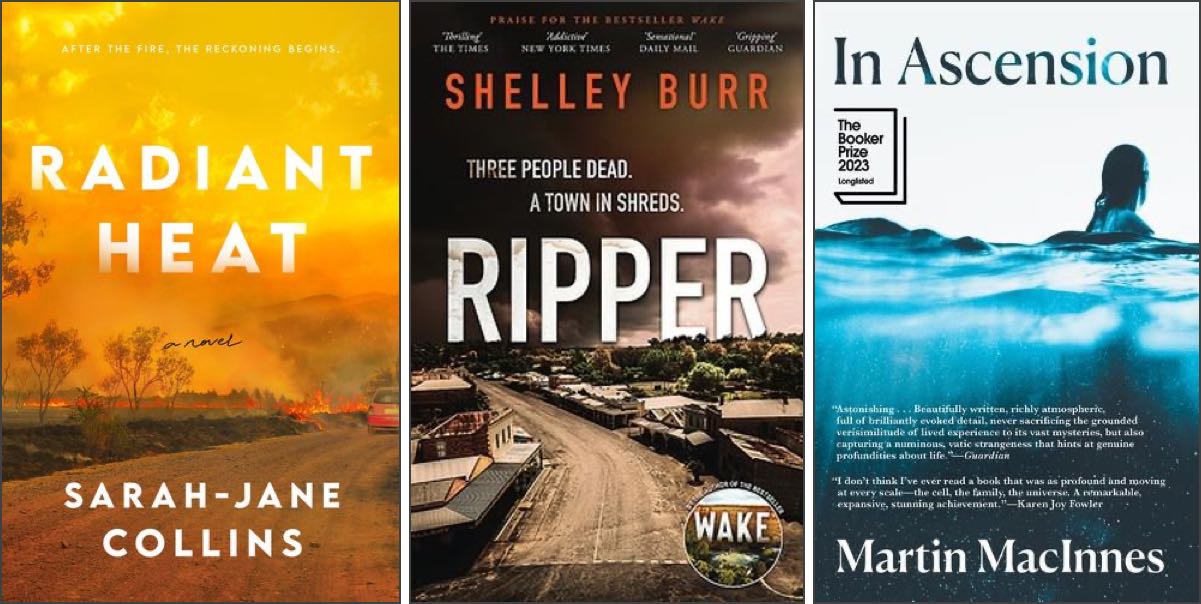
Issue #64: Saturday, 20 April 2024
A new section! Usually I watch very little television, and fewer full-length movies, but for various reasons I’ve been watching quite a bit more over the last month or so.

This is a newly-released series on AppleTV+. It stars the Swedish actor Noomi Rapace, who to me is memorable as Elizabeth Shaw, the expedition member horrifically impregnated with a tentacled alien in Ridley Scott’s movie Prometheus; but she also played the character Lisbeth Salander in the Swedish adaptation of The Girl with the Dragon Tattoo and its sequels. She’s an excellent actor.
In Constellation, Rapace plays Jo Erickson, a European Space Agency astronaut on board the International Space Station when there is a violent impact which destroys vital equipment and requires the Station to be abandoned. The accident also kills the station commander. Also on board was an important scientific experiment into quantum entanglement.
Due to the damage, only one of the two Soyuz craft which act as “lifeboats” for the ISS can immediately return to Earth, and three of the remaining crew do so, leaving Jo behind to try to repair the other. While she’s there she seems to begin to hallucinate.
The zero-gravity scenes in the ISS are very well done, including when the accident led to severe injury and significant blood loss, and pointing up the difficulty of carrying out CPR in a weightless environment.
When she finally returns to Earth and is reunited with her husband and ten-year-old daughter Alice, something is not quite right… And the things which aren’t quite right keep multiplying as the episodes go on. There are some very fraught but touching and well-acted scenes with Jo and her daughter Alice as they both struggle with what is happening, and with her increasingly bewildered husband Magnus.
Another major character is Dr. Henry Caldera, the physicist responsible for the quantum entanglement experiment. He’s an ex-astronaut who walked on the Moon during the (fictional) Apollo 18 expedition, and who has apparently also won a Nobel Prize for his scientific work (a bit unlikely, this combination). Or is he rather a depressed, frequently-drunk ex-astronaut called Bud who has fist-fights with fanatics claiming the moonwalks were a hoax? Or is he both?
The series asks very interesting questions about the nature of reality in the light of the findings of quantum physics.
It’s often very creepy, and ends on an extremely creepy note. Loved it! Highly recommended.
I imagine that there is likely to be a second season, but the ending of the first is satisfying enough even if there isn’t another (unlike the ending of the first season of Severance, I must say).
Note: I must really commend the truly excellent work by the child actors in this series, but I face an unusual dilemma in that in naming the actor who plays the young Alice, I would give away a major plot spoiler. Watch the series first, then look up her name.

This series is based on the Silo trilogy of Hugh Howey, comprising Wool, Shift, and Dust. Howey originally self-published these, but they were picked up by a major publisher, and here they are forming the basis for a television show.
It’s quite a while since I read the books, which were commercially published in 2012, and I haven’t re-read them since then. Because it’s twelve years since I read them, while I was watching the show I felt that it diverged radically from the book, but on scanning my ebook copy of Wool I see that I was quite wrong, it’s not far out at all. I’m tempted now to re-read the book and the sequels.
So. What’s it about?
The book, and the show open inside an underground complex, apparently drilled down into the ground by some huge machine. It’s like an inside-out skyscraper, with 144 levels. Various levels are dedicated to particular purposes, such as raising livestock and growing crops. At the very bottom (the “Down Deep”) are the electrical generators which power the whole complex. There’s a matching social stratification, and the Down Deepers are held in contempt by those above. The levels are connected by a continuous spiral staircase in the center of the void. Mysteriously, there are no elevators in the Silo, so all travelling has to be on foot, up and down the staircase.
The people of the Silo have been told that the world outside is full of poisonous gases, and that a breach in the structure would lead to everyone dying. This devastated world can only be seen through sensors at the surface, which relay video to viewing screens inside. Periodically so much dust and dirt builds up on the sensors that the view becomes clouded. People who have committed a very serious crime—or have simply declared that they wish to leave—are sent out to clean these sensors, which for some reason they always do, before dying of the toxic gases leaking into the primitive hazard suits they are given.
Here again we have a Swedish actress in the main role: Rebecca Ferguson (birth name Rebecca Louisa Ferguson Sundström, her mother being English). She plays the character Juliette Nichols, who we first meet as an engineer working in the Down Deep.
George Wilkins, a man Juliette has had a romantic relationship with is found dead, after apparently having committed suicide by leaping off the staircase. She, however, believes that he was murdered because he was getting too close to solving some of the mysteries of the Silo.
For complicated reasons I won’t go into, Juliette is eventually appointed as the Sheriff of the complex, in charge of police operations. Not long after she is appointed against the strenuous objections of some officials, more murders occur and she has to take severe risks, breaking the laws of the Silo herself, to investigate these murders and pursue George’s discoveries about the nature of the Silo.
I didn’t think this was as good a drama as Constellation, and there are times when it drags a little, but it is nevertheless entertaining and worth watching. I see that a second season has already been commissioned.
The only book I finished in the last three weeks was an audiobook. I hope to have more to review next issue.

An excellent piece of near-future science fiction by this Australian author, with a strong feminist message.
It’s set in England a few years from now, where a right-wing government has mandated the wearing of digital watches which as well as carrying out useful functions for the wearer, also reports back tracking information to the authorities and is always listening. Removing the watches for more than a few minutes is a crime.
The story is told from the points of view of Emma, a midwife working in a large hospital, and her daughter Lainey. Emma’s current working life is very difficult because a mysterious syndrome is causing an increasing number of babies to fail to draw breath once born, regardless of medical interventions. These deaths are shocking the nation and of course creating enormous grief for the bereaved parents. With this problem as leverage, the government is doubling-down on surveillance and mandatory reporting. Abortions are banned completely and no one can buy pregnancy tests without having the purchase reported to the authorities.
It’s with this as background that 15-year-old Lainey conspires with her close friend Serena to steal a pregnancy test from a pharmacy. Lainey has only had one sexual encounter but nevertheless thinks she is pregnant, and is deeply unwilling to let anyone, even her mother, know about it.
Adding to Lainey’s fear is that recently a number of pregnant girls, including one of her school friends, have gone missing. In some cases, even the girl’s parents have also vanished without telling anyone.
There are dramatic turns in the story as Lainey attempts to escape the country. Emma’s desperation to find her daughter after she goes missing thrusts the older woman into a series of moves she would never before have contemplated, as the truth of what is happening is slowly revealed.
I thought this was very well done, especially how plausible the author makes the slow descent into an authoritarian, surveillance society, as people begin to accept that their lives are more and more being observed, and that draconian laws “to protect life” are justified. It’s all too likely, I’m afraid. One only has to look at the taking-away of abortion rights in the United States in recent years, and the compulsion of the right wing in many countries to want to control the lives, bodies and sexuality of women.
Definitely recommended.
Note: Since I listened to this as an audiobook, I may well have misspelled characters’ names. Don’t judge me!


And that’s it for this issue. See you again in a couple of weeks.
If you’d like to make a modest contribution to my efforts in this newsletter, I’d love it if you would buy me a coffee.
Want to comment? Please send an email to:

© Copyright 2024 by David R. Grigg
and licensed under Creative Commons License CC BY-ND 4.0.